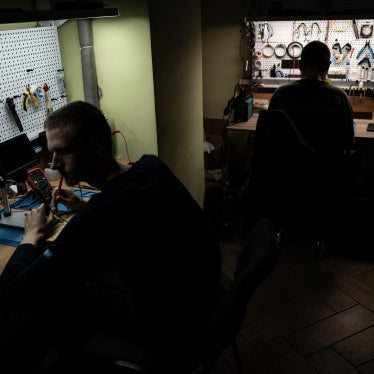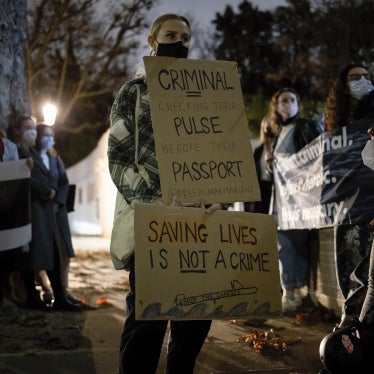Recent changes in Turkey's Anti-Terror Law have not ended the isolation regime in Turkey's new prisons.
A Justice Ministry spokesperson this week refused to answer Human Rights Watch's inquiry as to how the new law was being implemented and how many prisoners had been allowed out of their cells.
"It's been ten days now since the amendment's been adopted," said Jonathan Sugden, Human Rights Watch researcher on Turkey. "Every day that passes without a single prisoner emerging from isolation is a terrible disappointment. The Justice Ministry must stop this crisis and get its prisoners out of isolation now."
The 1991 Anti-Terror Law required that inmates be held permanently in one- or three- person cells with no contact with other prisoners. This provision was ignored until December 2000, when thousands of soldiers entered prisons to move inmates to newly constructed F-type prisons. The transfer operation resulted in the deaths of thirty prisoners and two soldiers.
The May 1 amendment to the Anti-Terror Law removed legal obstacles to allowing prisoners out of their cells during the day for education, training, and sport. But lawyers and prisoners' relatives have told Human Rights Watch that the lockdown in F-type prisons persists. To Human Rights Watch's knowledge, no prisoners in any of the four existing F-type prisons have been permitted out of their units since the amendment's adoption. The Justice Ministry's reticence appears to confirm this.
In the ten days since amendment was adopted, two more hunger-striking prisoners have died. The prisoners have been striking since October 2000, in protest against the isolation policy in the new prisons. To date, eighteen prisoners and four relatives have died. The Turkish government has tried to maintain a media blackout on the crisis. On April 27 the Istanbul-based Voice of Anatolia radio station was shut down for three months because it had broadcast a program on the prison crisis. The Council of Europe's Committee for the Prevention of Torture (CPT) has repeatedly called for an end to small-group isolation in F-type prisons. In two weeks, the Council of Europe, of which Turkey is a member, will be discussing the CPT's annual report for 2000 at a meeting in Istanbul.
"We hope that the Council of Europe will be doing all it can to break the deadlock before its arrival in Turkey," said Sugden. "While the Justice Ministry defies the Committee for the Prevention of Torture's recommendations, prisoners are being ill-treated in isolation."
Small group isolation is physically and psychologically damaging, but is also making prisoners more vulnerable to ill-treatment. Staff has reportedly beaten prisoners for failing to present themselves for roll call and for shouting slogans during cell searches. On April 23, guards beat Yunus ?g?, on hunger strike since his transfer to Sincan F-type Prison, when he was unable to rise to his feet for roll call, according to his father. He was subsequently hospitalized for several days, apparently for injuries resulting from the beating, and has now been returned to Sincan Prison.
The amendment, the result of pressure from domestic and international human rights organizations, makes access to out-of-cell activities conditional on prison resources and security considerations.
Lawyers and prisoners' relatives fear that prison administrators intent on keeping prisoners locked down will manipulate this loophole. The CPT has said that the vast majority of F-type prisoners does not present a security risk and should not be left indefinitely in their cells.
In past months, the Justice Ministry had stated repeatedly that prisoners would be allowed out-of-cell activities even before the adoption of the legal reform measure, but did not live up to this commitment. Since January, Human Rights Watch has urged that, in view of the crisis, any F-type prison lacking sufficient resources for immediate implementation of out-of-cell programs should, as an interim measure, permit prisoners on the same corridor to associate by opening cell doors during daylight hours.
Human Rights Watch first addressed the these issues with the Turkish government in a July 1999 memorandum warning that the planned regime of small group isolation might amount to cruel, inhuman and degrading treatment, and would expose prisoners to an increased risk of ill-treatment or torture.
For more information about Human Rights Watch's work relating to the F-type prisons, see: www.hrw.org/campaigns/turkey/prison/








